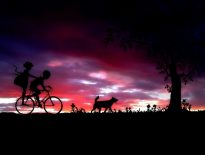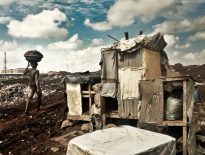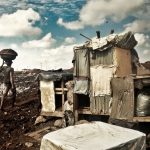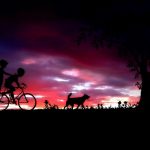It wasn’t 1967, there were no bombs coming down like rainfall nor were there bullets flying in the air. Ojukwu’s name wasn’t in everyone’s mouth and too many of us weren’t paying attention to the radio chatter. My father didn’t have a gun or a bunker to hide us in, the only protection was his Mercedes Benz that crawled after a Peugeot. The police buzzed around their makeshift checkpoints ordering every driver to keep their windows down. The traffic was normal for me. There was nothing new, pot-bellied men in official uniforms with long guns that had seen better days and an arm flexed from all the squeezing of naira notes.
“Close your eyes” my father ordered as our car left the Niger Bridge.
The day was going well, I mean every day goes well for a child whose only problem was learning the multiplication table. I had eaten breakfast, lunch and even snacks. A full belly ought to have led me to obedience but curiosity has always been my weakness, always wanting to know more led to my next actions.
“Close your eyes!” My father repeated.
I didn’t. I lowered my eyelids enough to convince my father, if he could have his eyes open why couldn’t I? Adamant as the first woman took a bite of the apple. As with every disobedience pain and regret came next as I saw a small man sprawled on the ground in his Jalabiya, there was a pool of blood around his head and an arm was displaced. Another feet away from him there was a smaller man in the same attire and a cap who looked contorted and very dead. While I couldn’t grasp the entirety of the scene, I only understood one thing that continuously fell from the lips of the adults.
“Ndi Hausa na ndi Igbo n’anu ogu.”
Today I understand, after the many visits to my uncle’s houses, the repeated government classes on the 1967 Nigerian Civil War, the chatter from the black radio in my mother’s kitchen and the voluntary reading of Chimamanda’s Half of a Yellow Sun. I now understand it all. This unending enmity between Eastern Nigeria and the Federation, a continual clash between the Igbos and the Hausas.
It isn’t 1967. There are no makeshift airstrips in Uli, Proda isn’t making war machines, the Igbos are not refining their own petroleum, and they have bought new properties in Port Harcourt. It isn’t 1967, it’s 2022. The Igbos are still grieving, my grandfather is still an unidentified corpse in Kaduna, his body trampled into the soil and coated with coal tar. His bones and that of many others are the very bane of our existence. There’s no ongoing war but blood is still being shed. I not only understand the struggle of my own people but live it. There’s no one telling me to close my eyes as I drive by Nkpor and hear air-shattering gunshots. I duck and accelerate, mindful of the mass hysteria. I snake through with eyes wide open as I am an adult now, I see these things voluntarily and involuntarily. It’s all part of the growth, you become aware. Your heart pounds loudly as a bullet hits the right mirror, you hold on tightly to the steering wheel with every intention to keep your siblings alive. You ignore the injured boy flagging you down, you speed through and manoeuvre every other hysterical driver because you have to make it home.
“Duck down! Close your eyes!” I repeat to my younger siblings just like my father had. Curiosity could be their Achilles heel but how much could you hide from a child in today’s society, either the news announces it or their smartphones inform them of what you fail to. At the very least I was saving them from the sight of an orange hawker who took a shot to the leg and collapsed on the ground.
“Close your eyes” I repeat, even when I know that we have all experienced violence greater than this. The massacre of your own mother at 1:00 am, the displacement of your eldest sister in 2020, the starvation of yesterday and the unending visions of killing yourself. Our own home has been a war zone for as long as I remember. My mother, the people of Biafra and my father, the Nigerian government; the unfair tussle between the two. The latter is wealthier, more connected and self-interested.
Just like any society with impending doom, you have activists and figureheads. While my mother posed more of a martyr in this war zone, Biafra has Nnamdi Kanu and Chief Ralph Uwazuruike leaders of two distinct groups with similar agendas; to give the Igbo people what God gave to Israel. But what God? Do we all believe in the God of the Israelites? Have we abandoned the gods of our fathers before? Whatever happened to Amadioha, whatever happened to Ikenga? They have simply become stories told to children and deities to be rebuked, maybe this is why Ndi Hausa seemingly have more power and cage us at the bottom. They have one God, they read from one book and follow one star, while we are torn between water goddesses and pythons, the Bible and cowries.
It’s 2022 and there are rumours about a war to come. Another tussle between two parties that strongly believe in their agendas. My grandmother keeps rebuking a repeat of 1967 because her soulmate was put down like a dog. She still narrates how she lost a child to hunger and how she ate lizards to survive. She tells these stories with a shaky breath but the tears never come, perhaps she has cried it all before my birth. A woman who has survived a war, buried a husband, seen a child’s grave and carried her grandchildren asks that there be no bloodshed. The crippled veteran who lives in a mud house awaiting the benefits promised to him after the surrender, asks that there be no war. What weight could the words of the elderly carry in a bloodthirsty society? What could words of war survivors carry to children who have no recollection of such a war? Ndi Igbo have to fight, don’t they? Don’t you fight for what you believe in? Do you sit with your arms crossed while birds pick at your farm? It would be foolish!
When wars happen, women get raped, people get displaced, and hunger and anxiety become the order of the day. You sleep with one eye open, a hungry belly, and whatever weapon you have. For my mother, that’s her Bible.
I’m home now, I’m safe with my siblings, and, there are no bullet holes in us but a few in the car. “Chukwu Dalu” my mother exclaims as we exit the vehicle.
She has such relief on her face as we make our way into another land mine. We’ve been here before so I watch for the footprints buried in the wet ground and head for my room, my siblings stealthy do the same. Later that evening, after a plate of abacha, we gather for prayers. My mother pulls out her weapon and asks God to prevent the rumoured war. She also asks that He limit the casualties in the one we currently fight though she had asked him twenty-seven years ago to prevent it. I say Amen because when you’ve grown in a war zone hope becomes your survival kit, the only thing that gives you a reason to see tomorrow.
In the Biafran war the Igbo people crafted their war weapons and armour tanks, many of which are displayed at the National war museum in Umuahia and others captured by the Nigerian government. Here I craft no weapons but parts of me have been captured, my hope and my trust cargoed away to a distant land.
As I sit at the salon, radio Biafra blasts through the speakers with women nodding their heads in agreement.
“You do know what will happen to us if there’s a war,” I ask, watching their countenance change.
“And you do know what will happen to people who never fight,” one of the women replied, and the rest chorused a “gbam!”
“Also, they are called cowards,” another added, and this opened a floodgate to a lecture.
In the twenty minutes I spent there, I was able to learn more about my people and what it was they were fighting for. Regardless of the earlier defeat, they were willing to try again, not even for themselves but for those who would come after them.
“Ka echi di mma. For a better tomorrow,” one of the women had said. She also narrated how her father and his brothers had died fighting for Biafra yet she was still willing to go through such loss again.
I am willing to try again, to recapture my hope and faith. To trust in God again, to fight this battle with every prayer I can say, to walk this narrow path of righteousness till the very end. I will set up a tent here and offer my youth as a sacrifice. I am willing to risk my losses and bruise my knees until peace comes home. I will take up a weapon just like my mother’s and wield it with courage. I know what happens to the people who never fight, the doubters and calf creators. They shrivel up in the flames, and their names are forgotten. This is my mantle, like the one handed to Moses, I am to bring my people to a promised land.
Let my People Go by Britney Muoghalu won the 2022 African Writers Award in the Creative Non-fiction category.
Click to see a full list of winners







